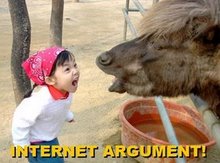| View previous topic :: View next topic |
| Author |
Message |
Zackback
Joined: 05 Nov 2010
Location: Kyungbuk
|
 Posted: Mon Feb 28, 2011 3:51 pm Post subject: What kind of speech is "when"? Posted: Mon Feb 28, 2011 3:51 pm Post subject: What kind of speech is "when"? |
 |
|
When Russia does declare war all nations will be alarmed.
Thank you |
|
| Back to top |
|
 |
CentralCali
Joined: 17 May 2007
|
|
| Back to top |
|
 |
Zackback
Joined: 05 Nov 2010
Location: Kyungbuk
|
 Posted: Mon Feb 28, 2011 4:00 pm Post subject: Posted: Mon Feb 28, 2011 4:00 pm Post subject: |
 |
|
Thanks. I had a person tell me that in this sentence it can be understood as meaning "if".
I'm not very good with the intricacies of grammar but I don't believe it.
Is it possible that "when" can be understood as "if" here? To me it looks definitive that it WILL happen. |
|
| Back to top |
|
 |
CentralCali
Joined: 17 May 2007
|
 Posted: Mon Feb 28, 2011 4:49 pm Post subject: Posted: Mon Feb 28, 2011 4:49 pm Post subject: |
 |
|
Both words are conjunctions and, in your sample sentence, do carry the same meaning.The entire sentence, using either will or if, indicates a particular action will follow another particular action. As your sample sentence stands now, the sentence does not indicate that Russia will definitely declare war. For that meaning, this sentence would probably be best:
| Quote: |
| All nations will be alarmed because Russia will declare war. |
If you move the clause containing Russia to the beginning of the sentence, then you will have:
| Quote: |
| Because Russia will declare war, all nations will be alarmed. |
|
|
| Back to top |
|
 |
grant gerstners
Joined: 13 Jan 2010
Location: USA
|
 Posted: Mon Feb 28, 2011 4:56 pm Post subject: Posted: Mon Feb 28, 2011 4:56 pm Post subject: |
 |
|
| Zackback wrote: |
Thanks. I had a person tell me that in this sentence it can be understood as meaning "if".
I'm not very good with the intricacies of grammar but I don't believe it.
Is it possible that "when" can be understood as "if" here? To me it looks definitive that it WILL happen. |
I agree that "when" can be intended and taken to mean "if", sometimes. However, this can lead to misunderstandings.
Speaking about the past, "when" communicates things that were true. For example: "When I was a child..."
But, "if" refers to things in the past/present that were/are not true. For example: "If I had more money..." or "If I had been faster..."
Speaking about the future, "when" communicates expectation of something happening. For example: "When the bus arrives..."
But "if" communicates the possibility of something happening, which might not happen and might not be expected to happen. For example: "If the bus arrives late..."
In German, "wenn" can mean either "if" or "when", and that has worked its way into some English usage. But, mostly, in English, "when" and "if" are distinct in meaning and usage.
In English, we have the expressions "if and when..." and "when, not if, ..." and these expressions highlight the difference in meaning. |
|
| Back to top |
|
 |
T-J

Joined: 10 Oct 2008
Location: Seoul EunpyungGu Yeonsinnae
|
 Posted: Mon Feb 28, 2011 5:23 pm Post subject: Posted: Mon Feb 28, 2011 5:23 pm Post subject: |
 |
|
When가 접속사예요.
|
|
| Back to top |
|
 |
thegadfly

Joined: 01 Feb 2003
|
|
| Back to top |
|
 |
The Cosmic Hum

Joined: 09 May 2003
Location: Sonic Space
|
 Posted: Mon Feb 28, 2011 7:59 pm Post subject: Re: What kind of speech is "when"? Posted: Mon Feb 28, 2011 7:59 pm Post subject: Re: What kind of speech is "when"? |
 |
|
| Zackback wrote: |
When Russia does declare war all nations will be alarmed.
Thank you |
...'when' is being used as an adverbial subordinator.
In this case, it is an adverbial subordinator of time.
As it pertains to the future (hypothetical event)�it is further classified as a conditional�hence the comparison to �if�.
It forms a dependent clause attached to an independent clause constructing a complex sentence.
When Russia does declare war - dependent (adverbial) clause - DC
...all nations will be alarmed. - independent clause - IC
Following the rules of complex sentences, a comma is required when the DC precedes the IC.
A comma is not required (or even permitted in most prescriptive cases) when the formula is IC DC.
When Russia does declare war, all nations will be alarmed. (DC, IC)
All nations will be alarmed when Russia does declare war. (IC DC)
Hope this is useful. |
|
| Back to top |
|
 |
|

